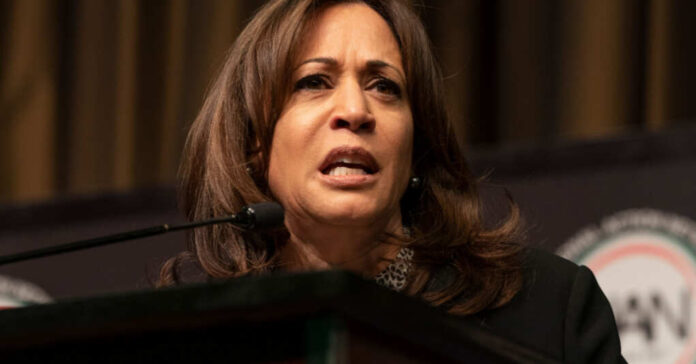In July 2020, only minority women made the short list of President Joe Biden’s final four contenders for his potential running mate.
An explicit request in an open letter to Biden came from 200 Black women, identified as Democratic activists and leaders, urging the selection of a black woman for vice president. The letter stated that Black women were critical for a 2020 Democrat win.
Democratic Representative Maxine Waters asserted in August 2020 that Biden would opt for a black woman as his running mate, attributing his primary campaign success to black voters.
And Biden happily complied, narrowing his list of potential vice presidential picks down to four black women.
But during a recent podcast, Kamala Harris seemed surprised that her race affected her selection as Biden’s running mate. She giggled and gaffed her way through a nonsensical reply, causing listeners to once again wonder how America is one heartbeat away from a Harris presidency.
Last week, an August interview with Harris conducted by Astead Herndon of The New York Times was featured on the Times’ “Run Up” podcast.
Herndon observed that Biden was committed to choosing a Black woman as a running mate. He pointedly asked Harris, “While that is obviously about you, it’s not necessarily you personally, but your identity. How should it matter? Does it matter that that narrative has existed, that Biden needed to choose someone who was a black person?”
Predictably, Harris’ response was a word salad expressing shock that people still feel her race was considered in Biden’s selection. “It happened. I don’t think. I honestly don’t understand your question. Has it lingered?” she said, peppering her answer with her signature giggles. “He chose a black woman; that woman is me, so I don’t know that anything lingers about who he chose. He chose; he asked me to join him on the ticket.”
Considering her spectacular failures in office, it’s hard to remember that Harris was selected from an impressive list of minority female rivals that, on paper, should have left her far behind in Biden’s choices.
California congresswoman Karen Bass was a contender, presumably because of her close personal relationship with former Senator Chirs Dodd (D-CT), who was in charge of Biden’s vetting committee. But Bass fell from favor after some comments praising Fidel Castro and her subsequent disastrous attempts to walk them back.
Illinois Senator Tammy Duckworth had a compelling personal narrative that resonated across the political spectrum. Having served as a helicopter pilot in Iraq and enduring the loss of both legs after being shot down, Duckworth received a Purple Heart for her bravery.
Transitioning into politics, Duckworth has held seats in the House and Senate in Illinois. Beyond her remarkable story and impressive political background, selecting Duckworth would have marked a historic moment as the first Asian-American and physically disabled female candidate on a national ticket. She was overlooked, however, because she was not Black and had very little name recognition outside her home state.
Susan Rice, former Obama-era United Nations Ambassador, seemed like a great choice as a running mate for Biden. Rice shares a personal connection with Biden, a quality he was seeking in his VP pick, and she was focused on restoring America’s reputation on the global stage. She was perfectly aligned with Biden’s campaign messaging, but her journey was cut short when critics recognized that the Trump campaign would target her with the Benghazi attack and its aftermath. Additionally, her involvement in a January 2017 meeting on Michael Flynn and the Russian election interference hoax may have become a point of contention.
But Kamala Harris stood out on the list because of her ability to check two boxes at once. As a Black and American Indian woman, it was observed that her candidacy would be even more historic than her rivals’. Harris came into the race with shadows of controversy, including her record during her tenure as California attorney general. She was also notably forced out of the 2020 primary race because Americans found her unlikable.
Polling suggests that her “unlikability” factor has not changed since her election. In a recent L.A. Times poll, 55% of Americans disapprove of her performance. That means her only official success is being less liked than Biden.
Harris may not understand a simple question regarding her race’s role in Biden’s running mate selection, and the nation needs a GPS to navigate her answer. Still, the real head-scratcher is figuring out why she got the golden ticket in the first place out of a lineup of more qualified contenders. It was the worst outcome in a game of rock-paper-scissors gone horribly wrong.

















